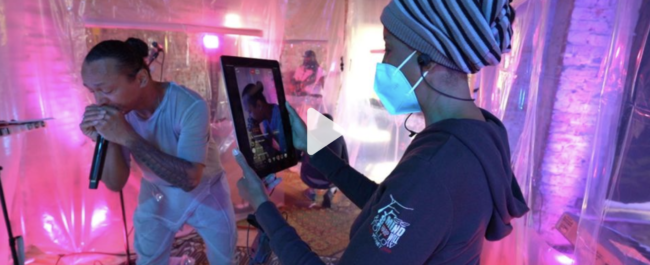Yonnet on CNN: Connecting His Neighborhood, and the World, during Covid-19
Covid-19 fractured Fred Yonnet’s musical life. The acclaimed harmonica player’s band, Frederic Yonnet and The Band with No Name, could not play together. Their gigs were canceled. There was nowhere to practice.
As Yonnet quickly found out, face masks and harmonicas do not live in harmony.
Born in Normandy, France, Yonnet moved to Washington, DC in 2001, where he eventually befriended Dave Chappelle. Chappelle, in turn, introduced him to Prince and Stevie Wonder. Yonnet toured with each artist for several years.
But Covid-19 changed everything.

“When Covid hit, I was driving my wife nuts,” Yonnet said from his makeshift studio in Capitol Hill. “She wanted me to focus on something creative. I wanted to play. It was just a need of performing and playing the harmonica.”
Virtual performances are the new normal in music. The Rolling Stones, Billy Eillish and The Backstreet Boys have recently thrilled TV and online audiences. Each band performer records parts individually. The different feeds are then joined on one screen.
Yonnet’s band, however, relies heavily on improvising and timing. Face-to-face interaction is essential.
“We are a live band,” Yonnet said. “Timing is extremely important so we can be in sync. If you try and communicate with somebody through any of those online platforms, by the time it takes the sound to travel back and forth, (the delay) it’s too great for us.”
Cutting edge inspiration
Inspired by the television series “Breaking Bad” and “Dexter,” Yonnet came up with a creative solution to unite his band in one room while practicing social distancing. He had access to an empty Capitol Hill corner home that had been gutted and was being restored
“I came up with this idea of stapling big sheets of plastic to the ceiling to separate the band members from each other, then cutting some clear shower curtains to create eye contact by creating these giant plastic face masks,” Yonnet said.

The idea worked. Yonnet and his band could now play. But what would the neighbors say about the noise?
“We knew that it was going to be loud, so we decided to let the neighbors know,” Yonnet said. “It was an opportunity to invite them to come outside and enjoy the music.”
Sandy Schmierer, a neighbor, said from her porch: “His wife sent out an email to the neighborhood telling everybody they were going to have a jam session, and if we wanted to listen it was going to start at 4 o’clock (on Sunday), so we decided to listen.”
The five band members met to rehearse on a Sunday afternoon in late March. They wore facemasks and entered their individual plastic chambers on the upper level of the empty house. The neighbors began to gather outside, spaced apart on their porches and lawn chairs.
“They were very welcoming to the idea,” Yonnet said. “They started gathering and asked us to open the windows and turn the music up so they could enjoy themselves. They got comfortable in their front yards drinking wine and eating cheese.”
Play locally, resonate globally
After the positive response, the band began to expand from its Capitol Hill confines. What began as an organic gathering drawn together by live music moved to social media via live streams on Facebook and Instagram.
Yonnet and his wife created virtual jazz rehearsals dubbed Eavesdrop. Soon Yonnet’s friends like Quincy Jones, Chappelle, DJ D-Nice and comedian Michelle Wolf began to watch. They also gave shout outs and helped build a global following to the performances.
“We have people from literally all over the world watching this,” Yonnet said. My family gets to watch from their homes in France, my brother, father, they haven’t seen each other in months but yet we can connect through this.”
Connecting locally while streaming globally during international isolation produced an unforeseen result.
“We started meeting neighbors we had no idea lived in the neighborhood for 20, 30, 40 years,” Yonnet said.
Steve Ruder, a Capitol Hill resident, said: “I think it’s the music. It’s ironic because we’re trying to keep our distance, we’re trying to do the right thing, yet we really need to stay together, and I think he’s helping us to keep that cohesion together while still trying to live within this new reality.”
“We have people who now come every Sunday,” said Schmierer, Yonnet’s neighbor. “We didn’t know these people before and now we do. It’s wonderful. It’s a gift.”
The irony is not lost on Yonnet.
“At a time when everybody is respecting social distancing rules and isolated at home, this place is actually bringing people together. That’s the power of music.”

